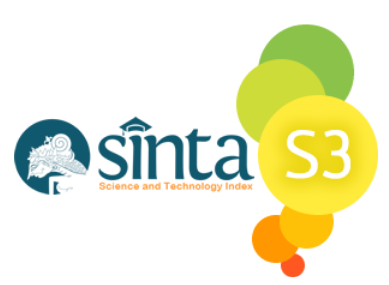The Internationalization Program of State Universities: Student’s Perspective
Abstract
Keywords
References
Alfaro, I. J., Boullosa, A. P., Andreu‐Besó, J. V., De Lamo, J., Sobrado, L., Sanz, R., & Arias, J. M. (2009). Student opinion of the information policies of four Spanish universities with regard to Erasmus and other international programmes. Higher Education in Europe, 34(3-4), 313-332.
Coffey, M., & Gibbs, G. (2001). The evaluation of the student evaluation of educational quality questionnaire (SEEQ) in UK higher education. Assessment & Evaluation in Higher Education, 26(1), 89-93.
Fowler, F. J. (2014). The Problem with Survey Research. Contemporary Sociology, 43(5), 660–662. https://doi.org/10.1177/0094306114545742f
Guyadeen, D., & Seasons, M. (2016). Plan evaluation: Challenges and directions for future research. Planning Practice & Research, 31(2), 215-228.
Hafiar, H., Setianti, Y., and Syuderajat F. (2006), Pengaruh Keberadaan Pergurua Tinggi di Kawasan Pendidikan Jatinangor terhadap Motivasi Siswa untuk Melanjutkan Studi pada SMUN I Cikeruh S
Haussler, S. C., Paavilainen, E., & Åstedt-Kurki, P. (2003). Finnish students’ perceptions of a visiting professor. Journal of Professional Nursing, 19(2), 99-105.
Jessani, N. S., Hendricks, L., Nicol, L., & Young, T. (2019). University curricula in evidence-informed decision making and knowledge translation: integrating best practice, innovation, and experience for effective teaching and learning. Frontiers in public health, 7, 313..
Lesch, A., Pisano, J., & Kapila, Y. L. (2014). The student perspective: International exchange programs. The Journal of the Michigan Dental Association, 96(6), 33-34.
Pfotenhauer, S. M., Jacobs, J. S., Pertuze, J. A., Newman, D. J., & Roos, D. T. (2013). Seeding change through international university partnerships: the MIT-Portugal program as a driver of internationalization, networking, and innovation. Higher Education Policy, 26(2), 217-242.
Wiliawanto, W., Bernard, M., Akbar, P., & Sugandi, A. I. (2019). Penerapan Strategi Pembelajaran Aktif Question Student Have Untuk Meningkatkan Kemampuan Berpikir Kritis Matematik Siswa SMK. Jurnal Cendekia: Jurnal Pendidikan Matematika, 3(1), 139-148.
DOI: https://doi.org/10.18551/erudio.8-1.9
Refbacks
- There are currently no refbacks.
Copyright (c) 2021 Erudio Journal of Educational Innovation

This work is licensed under a Creative Commons Attribution 4.0 International License.












